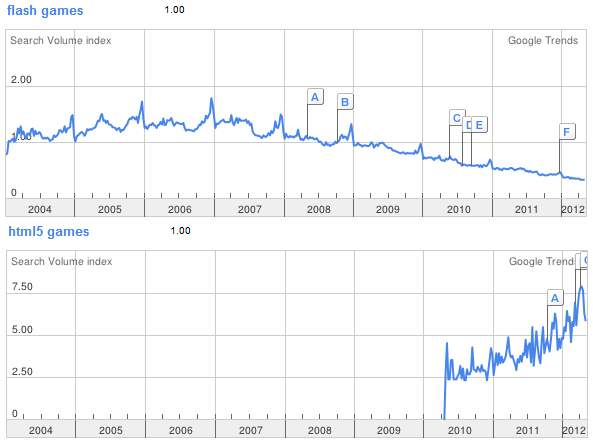The Golden Child: Flash Games
For several years now Adobe Flash has been the dominate technology used to create online games. It is so popular in fact that the term “flash games” has almost become synonymous with browser based games in general. Take a look at all of the major gaming portals; with a few exceptions, practically all of the games they offer are flash games. What’s so wrong with Flash you ask? Well nothing really. It was an amazing technology that was used to add all sorts of functionality to browsers. Through the use of a plug-in developers could now include all sorts of interactivity and animated graphics to their web pages. However things are changing, and Flash may no longer be the best fit for many online applications. Browsers are a lot smarter now and they are only going to continue to get smarter. Rather than relying upon plug-ins to display interactive and graphically intense pages modern browsers can do it all by themselves. Utilizing the W3C, the specification for HTML5, browser makers are including all sorts of functionality into their products that web developers can now use to make graphically intensive and interactive websites. This has special implications for online game designers. Soon (hopefully) designers will no longer be forced to choose from a select few proprietary technologies that not only are expensive, but also obligate their end users to download, install, and regularly update the respective plug-ins.The New Kid on the Block: HTML5 Games
Traditionally the role of HTML has been used primarily to define and layout the text on web pages. Over the years, however, its role has slowly evolved to be more interactive. The new HTML5 spec furthers this evolution by including definitions for several additional elements aimed at interactivity, multimedia, and graphics. Combinethese new HTML5 elements with the faster and enhanced JavaScript engines available in modern browsers and you now have a set of tools perfectly suited for online game development.Some advantages of HTML5 for Games
Not only are the HTML5 technologies well suited for creating browser based games, they offer several advantages over proprietary options. HTML5 is an open technology. It doesn’t cost anything and technically only requires a simple text editor to code in. Never underestimate the power of free. Flash and other proprietary technologies all cost the developer. While this certainly isn’t the only factor that a game developer would consider, it certainly does play a role, and for the small time indie developer it might be a very big factor. Compatibility is another huge advantage HTML5 has. HTML is the lowest common denominator for all web based devices. By using HTML5 you can target a wider array of devices and gadgets without having to specifically port your game to each different platform. Another often forgotten advantage is ease of use. For the technically savvy, downloading, installing, and updating plug-ins is only a minor hassle. However, for less technically savvy users this can be quite a hurdle and just may turn away users altogether.Some Interesting Charts
 Above you will find some charts from Google Trends for the search term “flash games” and then also the term “html5 games”. It is easy to see that searches for “flash games” have been in steady decline for over the past 5 years while searches for HTML5 games have seen some pretty impressive growth in the past 3 years. While this really doesn’t prove anything, it is an interesting metric to help gauge the popularity trends of the two different technologies. It is important to note that these charts show only relative search volume and not overall volume. Per the Google Adwords tool, the monthly global search volume for “flash games” is 11,100,000 compared to a measly 49,500 for “html5 games”.
Above you will find some charts from Google Trends for the search term “flash games” and then also the term “html5 games”. It is easy to see that searches for “flash games” have been in steady decline for over the past 5 years while searches for HTML5 games have seen some pretty impressive growth in the past 3 years. While this really doesn’t prove anything, it is an interesting metric to help gauge the popularity trends of the two different technologies. It is important to note that these charts show only relative search volume and not overall volume. Per the Google Adwords tool, the monthly global search volume for “flash games” is 11,100,000 compared to a measly 49,500 for “html5 games”.
The Future of online Games
Will HTML5 be the end of plug-in based games? If it is, it is pretty safe to say that it won’t be happening anytime soon. It is estimated that the HTML5 spec will not be fully implemented until 2022. Despite this long time-frame, browser makers are already racing to include all the HTML5 functionality that they can. Game developers have taken advantage of this and created numerous quality games that easily compete with their flash counterparts. Take a look at all these HTML5 games to see some excellent examples of what is already possible with the new technology. Given the current search trends and the several advantages HTML5 has over Flash, the future for HTML5 games looks bright. While it is not certain if HTML5 will eventually win out to become the gaming technology of choice, one thing is for certain: the love of online casual gaming has captured the interest of millions and as long as that interest exists developers will continue to create fun and exciting games.Frequently Asked Questions about HTML5 and the Future of Online Games
What makes HTML5 a preferred choice for online game development?
HTML5 is a powerful tool for online game development due to its cross-platform compatibility. It allows developers to create games that can be played on various devices, including desktops, laptops, tablets, and smartphones, without requiring any additional software or plugins. This flexibility makes it easier for users to access and play games, regardless of their device or operating system. Additionally, HTML5 supports advanced graphics and animations, which can enhance the gaming experience.
How does HTML5 contribute to the future of online games?
HTML5 is shaping the future of online games by enabling more interactive and immersive gaming experiences. It supports advanced features like 2D and 3D graphics, audio APIs, offline asset storage, and real-time networking. These features allow developers to create high-quality games that can rival native apps in terms of performance and user experience. Moreover, HTML5 games can be easily distributed and monetized, which makes it a promising platform for the future of online gaming.
Are HTML5 games compatible with all browsers?
HTML5 games are designed to be compatible with all modern web browsers that support HTML5 standards. This includes browsers like Google Chrome, Mozilla Firefox, Safari, and Microsoft Edge. However, the performance and functionality of HTML5 games may vary slightly between different browsers due to differences in how they implement HTML5 standards.
What are the limitations of HTML5 for game development?
While HTML5 offers many advantages for game development, it also has some limitations. For instance, HTML5 games may not perform as well as native apps on devices with limited processing power or memory. Additionally, HTML5 does not support some advanced gaming features like hardware-accelerated 3D graphics or multi-threading. However, these limitations are gradually being addressed as HTML5 and web technologies continue to evolve.
Can I play HTML5 games offline?
Yes, HTML5 games can be played offline thanks to the offline storage capabilities of HTML5. Developers can store game assets like images, audio files, and scripts locally on the user’s device, allowing the game to run even without an internet connection. However, the availability of offline play may vary between different games depending on how they are designed.
How secure are HTML5 games?
HTML5 games are generally secure as they run within the sandboxed environment of the web browser, which isolates them from the rest of the system. However, like any online content, they can be vulnerable to security risks if not properly designed or maintained. It’s important for developers to follow best practices for web security when creating HTML5 games.
Can I monetize my HTML5 games?
Yes, there are several ways to monetize HTML5 games. You can sell your games directly to users, offer in-app purchases, or generate revenue through advertising. Additionally, you can license your games to other websites or platforms. The flexibility and wide reach of HTML5 make it a viable platform for game monetization.
How can I learn to develop HTML5 games?
There are many resources available for learning HTML5 game development. You can start with online tutorials and guides that cover the basics of HTML5 and game development. There are also many books and online courses that offer more in-depth instruction. Additionally, you can learn from the open-source code of existing HTML5 games.
What tools do I need to develop HTML5 games?
To develop HTML5 games, you will need a text editor for writing code, a web browser for testing your game, and graphics software for creating game assets. There are also many game engines and libraries available that can simplify the development process, such as Phaser, CreateJS, and Babylon.js.
What is the future of HTML5 game development?
The future of HTML5 game development looks promising. As web technologies continue to evolve, we can expect to see more advanced features and capabilities being added to HTML5. This will enable developers to create even more sophisticated and immersive games. Additionally, the growing popularity of mobile gaming and the increasing adoption of HTML5 by game developers suggest that HTML5 will play a significant role in the future of online gaming.
Jarred Draney is a self-taught computer nerd who grew up in the western United States. He is not fond of working for the man, and is passionate about gaming, programing, web development, and online entrepreneurship. He is involved in a variety of web development projects and hopes that one day they will be his main source of income.


